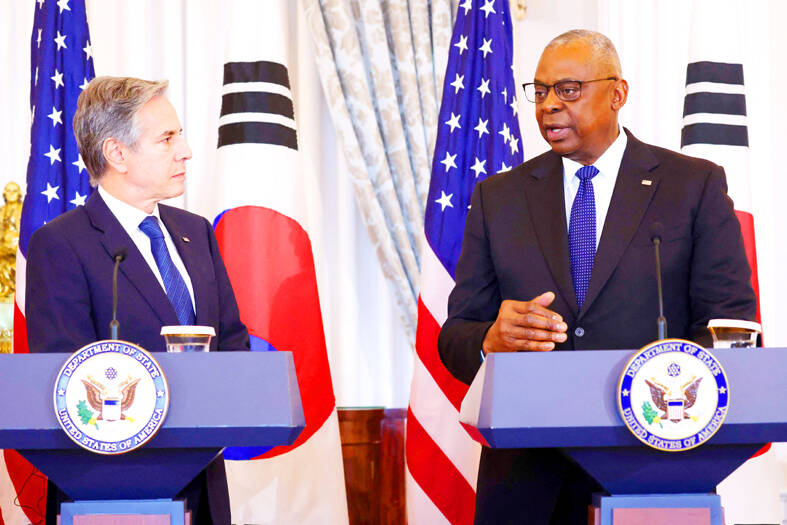The US and South Korea on Thursday called on China to use its influence over Russia and North Korea to prevent escalation after Pyongyang sent thousands of troops to Russia to aid Moscow’s war against Ukraine.
In a meeting earlier this week, three top US diplomats met with China’s ambassador to the US to emphasize Washington’s concerns and urge China to use its sway with North Korea to try to curtail the cooperation, said a US Department of State official, who spoke on condition of anonymity.
US Secretary of State Antony Blinken on Thursday said that the sides had “a robust conversation just this week” and that China knows US expectations are that “they’ll use the influence that they have to work to curb these activities.”

Photo: AFP
However, “I think this is a demand signal that’s coming not just from us, but from countries around the world,” Blinken told a news conference in Washington alongside US Secretary of Defense Lloyd Austin and their South Korean counterparts.
Liu Pengyu (劉鵬宇), spokesman for the Chinese embassy in Washington, said in a statement that China’s position on the Ukraine crisis is “consistent and clear.”
China strives “for peace talks and political settlement of the Ukraine crisis. This position remains unchanged. China will continue to play a constructive role to this end,” Liu said.
The US says that 8,000 North Korean soldiers are in Russia near Ukraine’s border and are preparing to help the Kremlin fight against Ukrainian troops in the coming days.
China has yet to publicly comment on the move.
Austin said China “should be asking Russia some hard questions at this point and whether it intends to broaden this conflict by this kind of behavior.”
Beijing has forged a “no limits” partnership with Moscow, and while it has also been a major ally for Pyongyang, experts say Beijing might not approve of the closer military partnership between Russia and North Korea because it sees it as destabilizing in the region.
The Russia-North Korea partnership runs contrary to Beijing’s goal for a peaceful Korean Peninsula, said Shi Yinhong (時殷弘), an international relations expert at Renmin University in Beijing.
The Chinese government is “aware of the complexity and danger of the situation,” Shi said, adding that the “fact that China hasn’t said anything yet on the military alliance agreement between North Korea and Russia indicates that China strongly disagrees with it.”
Dennis Wilder, senior fellow for the Initiative for US-China Dialogue on global issues at Georgetown University, called Beijing’s “radio silence” on North Korea’s move “staggering.”
Beijing must find a balance between supporting Moscow and not angering the West, Wilder said, adding that Chinese President Xi Jinping (習近平) might “for his own sake ignore the whole thing.”

TRAGEDY STRIKES TAIPEI: The suspect died after falling off a building after he threw smoke grenades into Taipei Main Station and went on a killing spree in Zhongshan A 27-year-old suspect allegedly threw smoke grenades in Taipei Main Station and then proceeded to Zhongshan MRT Station in a random killing spree that resulted in the death of the suspect and two other civilians, and seven injured, including one in critical condition, as of press time last night. The suspect, identified as a man surnamed Chang Wen (張文), allegedly began the attack at Taipei Main Station, the Taipei Fire Department said, adding that it received a report at 5:24pm that smoke grenades had been thrown in the station. One man in his 50s was rushed to hospital after a cardiac arrest

PUBLIC SAFETY: The premier said that security would be tightened in transport hubs, while President Lai commended the public for their bravery The government is to deploy more police, including rapid response units, in crowded public areas to ensure a swift response to any threats, President William Lai (賴清德) said yesterday after a knife attack killed three people and injured 11 in Taipei the previous day. Lai made the remarks following a briefing by the National Police Agency on the progress of the investigation, saying that the attack underscored the importance of cooperation in public security between the central and local governments. The attack unfolded in the early evening on Friday around Taipei Main Station’s M7 exit and later near the Taipei MRT’s Zhongshan

SAFETY FIRST: Double the number of police were deployed at the Taipei Marathon, while other cities released plans to bolster public event safety Authorities across Taiwan have stepped up security measures ahead of Christmas and New Year events, following a knife and smoke bomb attack in Taipei on Friday that left four people dead and 11 injured. In a bid to prevent potential copycat incidents, police deployments have been expanded for large gatherings, transport hubs, and other crowded public spaces, according to official statements from police and city authorities. Taipei Mayor Chiang Wan-an (蔣萬安) said the city has “comprehensively raised security readiness” in crowded areas, increased police deployments with armed officers, and intensified patrols during weekends and nighttime hours. For large-scale events, security checkpoints and explosives

ON ALERT: Taiwan’s partners would issue warnings if China attempted to use Interpol to target Taiwanese, and the global body has mechanisms to prevent it, an official said China has stationed two to four people specializing in Taiwan affairs at its embassies in several democratic countries to monitor and harass Taiwanese, actions that the host nations would not tolerate, National Security Bureau (NSB) Director-General Tsai Ming-yen (蔡明彥) said yesterday. Tsai made the comments at a meeting of the legislature’s Foreign Affairs and National Defense Committee, which asked him and Minister of National Defense Wellington Koo (顧立雄) to report on potential conflicts in the Taiwan Strait and military preparedness. Democratic Progressive Party (DPP) Legislator Michelle Lin (林楚茵) expressed concern that Beijing has posted personnel from China’s Taiwan Affairs Office to its